

What is information literacy? - CILIP: the library and information association. Open University Library Services. - Digital and Information Literacy Framework. What is digital literacy and how is it different from information literacy?
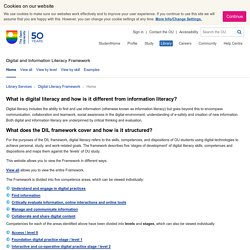
Digital literacy includes the ability to find and use information (otherwise known as information literacy) but goes beyond this to encompass communication, collaboration and teamwork, social awareness in the digital environment, understanding of e-safety and creation of new information. Both digital and information literacy are underpinned by critical thinking and evaluation. What does the DIL framework cover and how is it structured? For the purposes of the DIL framework, digital literacy refers to the skills, competences, and dispositions of OU students using digital technologies to achieve personal, study, and work-related goals. Log In. Introduction to Crash Course Navigating Digital Information #1. Toolkit Full Fact. Students learn more effectively from print textbooks than screens, study says.
Screen vs. paper: what is the difference for reading and learning? Introduction It all started with a project at Uppsala University Library in Sweden called ‘Mobile Academics’, where we held seminars on how to use the library’s e-resources on a tablet computer and gave tips on different apps to use when studying.
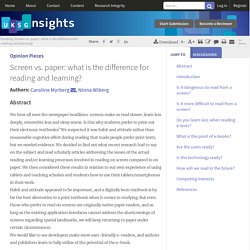
This project led to another seminar about the difference between reading on screen and on paper. To prepare for it, we read scientific articles and picked out a few of those as examples. We chose to focus on the articles that were more current, since studies made on screens from 1985 cannot be compared with the studies made on today’s screens. It is not only the devices that have evolved, either: people have, too. UK schools are failing on higher education preparation – so universities must help. That only 5 per cent of white working-class children gain places at the UK’s leading universities is a national scandal.
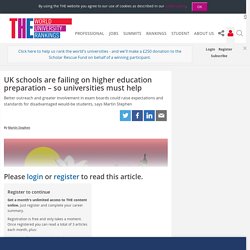
But those commentators who lay the failure at the door of admissions tutors are wrong. As someone who has spent my career in English secondary education, I attribute much of the blame to my own sector. The truth is that after 13 years of education in one of the world’s richest countries, disadvantaged students in England still largely lack the necessary knowledge base to thrive on a demanding university course – particularly in science, technology, engineering and mathematics. Universities are not social engineers, and, besides, it is too late to prepare a student at 18 for a rigorous degree course in maths or physics. The London Academy of Excellence – a large, selective sixth-form college in a poor part of London, of which I am the founding governor – shows that such preparation is perfectly possible in state schools. Crash course digital information.
US woman wrongly identified as Sri Lanka attack suspect. The Fake News Generator. Website Evaluation - Information Literacy - Homepage at NYC DOE Office of Library Services. Taking Notes By Hand May Be Better Than Digitally, Researchers Say : NPR. NPR Choice page. The Fosil Group. LILAC 2019: The Information Literacy Conference for librarians. Watch "Introduction to Media Literacy: Crash Course Media Literacy #1" on YouTube - jwelby - Shebbear College Mail.
Going Digital. Resources for schools. Updated for the revised curriculum from September 2014, our lesson plans have been developed by teachers and tailored to specific areas of the curriculum.
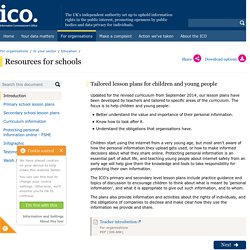
The focus is to help children and young people: Better understand the value and importance of their personal information.Know how to look after it.Understand the obligations that organisations have. Children start using the internet from a very young age, but most aren't aware of how the personal information they upload gets used, or how to make informed decisions about what they share online. Online Harms White Paper. Hoaxy® by OSoMe. Hoaxy® by OSoMe. How to read the news like a scientist. Jenice Kim Overwhelmed by your news feed?
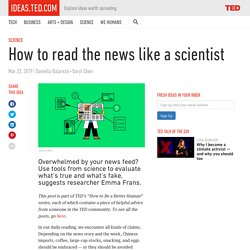
Use tools from science to evaluate what’s true and what’s fake, suggests researcher Emma Frans. This post is part of TED’s “How to Be a Better Human” series, each of which contains a piece of helpful advice from someone in the TED community. To see all the posts, go here. In our daily reading, we encounter all kinds of claims. Try thinking like a scientist, says Emma Frans, who’s an epidemiology and psychiatry researcher at Oxford University in the UK and Karolinska Institutet in Sweden. “In present times, our risk of being fooled is especially high,” she says. Which is why it’s useful to know how to evaluate news the way a scientist does. Safeguarding Essentials – Have your say: Internet Crazes. When the Internet and social media turns a fad into a global craze When I was growing up, I remember countless fads and trends that came and went, either in the confines of school or within my group of friends at home.
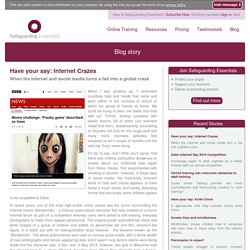
We could be trying to learn the latest cool trick with our ‘YoYos’, arming ourselves with plastic lemons full of water (our teachers hated that one!) , skateboarding, scrambling on bicycles not built for the rough stuff and many more harmless activities that occupied us for a couple of months until the next big ‘thing’ came along. It’s fair to say, and I think you’ll agree, that there was nothing particularly dangerous or sinister about our childhood fads (apart from those, maybe, that experimented with smoking or alcohol); however, in these days of social media, the historically innocent world of fads and crazes appears to have found a much darker and frankly disturbing format that worryingly some children appear to be compelled to follow. Momo challenge: The media is whipping up a moral panic over a 'suicide game' which might not even exist.
In brief The challenge has continued to be heavily covered by the media This story was originally published 12:30pm, 25 February 2019 In several countries several thousand miles away, three unnamed teenagers are rumoured to have died last year because of an internet challenge known as “Momo”.
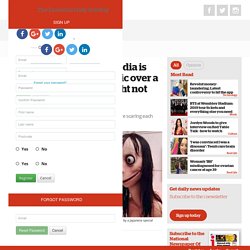
No local authorities have confirmed a link between the children’s deaths and the so-called Momo challenge. This is hardly an earth-shattering story, and unsubstantiated rumours are unlikely to set your spine shivering – so it’s understandable that some British newspapers have opted for a slightly different angle. “An evil suicide game which encourages youngsters to harm themselves and in some cases even take their own lives has spread to the UK,” read the Mail Online on 21 February. What is the Momo challenge? Using librarians to foster information literacy – Community College Daily.
Librarians are powerful pedagogical resources. We are teachers, collaborators and instructional designers. We teach students how to think about their research needs, reflect upon their experiences, and consider different types of sources. We don’t just want students to use the right formatting when they build citations, we want them to know why they should include citations in their work at all. Information literacy is considered an essential learning outcome by the Association of American Colleges & Universities and among its high-impact educational practices. NewsWise. Lesson 8: Verification Lesson plan (Google Doc) (PDF) (Word) Activity 8.1 (PDF) (Word) Activity 8.2 (PDF) (Word) Activity 8.2 – Teacher version (PDF) (Word)
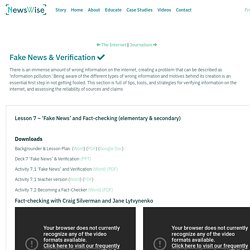
NewsWise. 'The goal is to automate us': welcome to the age of surveillance capitalism. We’re living through the most profound transformation in our information environment since Johannes Gutenberg’s invention of printing in circa 1439.
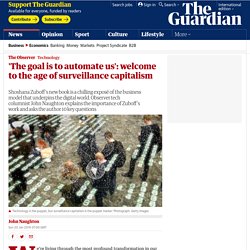
And the problem with living through a revolution is that it’s impossible to take the long view of what’s happening. Hindsight is the only exact science in this business, and in that long run we’re all dead. Printing shaped and transformed societies over the next four centuries, but nobody in Mainz (Gutenberg’s home town) in, say, 1495 could have known that his technology would (among other things): fuel the Reformation and undermine the authority of the mighty Catholic church; enable the rise of what we now recognise as modern science; create unheard-of professions and industries; change the shape of our brains; and even recalibrate our conceptions of childhood.
Navigating Digital Information. CILIP responds to Culture, Media and Sport Select Committee Inquiry on Fake News & Disinformation - CILIP: the library and information association. CILIP responds to Culture, Media and Sport Select Committee Inquiry on Fake News & Disinformation CILIP, the UK professional association for librarians and information professionals, has responded to the final report of the Culture, Media and Sport Select Committee inquiry on Fake news and Disinformation, calling on Government to recognise the vital role of librarians and information professionals in protecting the public from online harms.
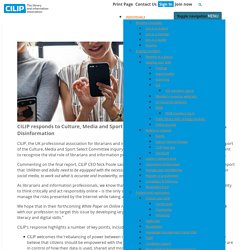
Commenting on the final report, CILIP CEO Nick Poole said, “CILIP welcomes the findings in the CMS Committee report that ‘children and adults need to be equipped with the necessary information and critical analysis to understand content on social media, to work out what is accurate and trustworthy, and what is not’ – what we call ‘information literacy’. Nicola Morgan’s Presentations on SlideShare. Students learn more effectively from print textbooks than screens, study says. Today’s students see themselves as digital natives, the first generation to grow up surrounded by technology like smartphones, tablets and e-readers. Teachers, parents and policymakers certainly acknowledge the growing influence of technology and have responded in kind.
We’ve seen more investment in classroom technologies, with students now equipped with school-issued iPads and access to e-textbooks. In 2009, California passed a law requiring that all college textbooks be available in electronic form by 2020; in 2011, Florida lawmakers passed legislation requiring public schools to convert their textbooks to digital versions. Given this trend, teachers, students, parents and policymakers might assume that students’ familiarity and preference for technology translates into better learning outcomes. Are Libraries the Key to Teaching Digital Literacy? Public libraries and school libraries are crucial for teaching digital literacy. Libraries offer much more than books. Study Skills for 6th Form. Internet resources for EPQ - EPQ Support - My Subject at Middlesex University Library and Student Support.
Fake news and critical literacy introductory resources. Retrieval Practice Challenge Grid Templates. Kidsmart: a practical Internet safety advice website for schools. Jeremy Wright's speech at the Parliament and Internet Conference. Good afternoon everyone. And thank you to everybody who has contributed to the debates today. Finding the right relationship between technology and Government is an age old question. Especially how we strike the right balance between innovation and regulation.
Because technology transforms everything in its path. Our legal frameworks, our ethical values and the everyday norms of our society. The invention of the printing press required new ways of thinking about copyright and the ownership of ideas. The ‘dark and satanic mills’ of the Industrial Revolution led to questions around public health and working conditions. Supporting Information Literacy in the Field of Education. Giving Students the Skill of "Learning to Learn" New research is overturning many of the traditional ideas about how people learn.
For example, many people believe in the idea of learning styles, despite the fact that this approach turns out to have very little evidence of effectiveness. For schools, the changing research has deep implications, especially when it comes to teaching students how to “learn to learn.” JCS 2018: From Digital Literacy to Independent Learning.
Why Do People Fall for Fake News? The continuing trouble with terminology… – Digital literacy unpacked. BIG 6 Research Posters. Supporting your Wellbeing. THIS IS HOW YOU SHOULD START YOUR DAY - Best Morning MotivationBest morning motivation to start your day right! Listen to this in the morning! Motivational Alarm Clocks ButterflyMax begins to dress and behave as a girl but when he wants to be known as Maxine, his father struggles to cope with the news. Lateral Reading: A How-To. Information literacy librarians (correctly) teach students to evaluate the websites they use for papers and other academic purposes by looking at features such as the site’s domain, its appearance, who the author is, etc.
Information Literacy Website – Brought to you by the CILIP Information Literacy Group. Guest post: Information Literacy and senior leadership – Information Literacy Website. Event review: Digital competencies for digital citizenship: an emerging agenda for students, academics and libraries in partnership – Information Literacy Website. Event review: “Weighed down by Words: An academic writing project” – Information Literacy Website. Abi Ward, Subject Support Librarian at UWE and the ILG’s Member Relationship Officer, reports on an event run by Stewart Hilland, Lecturer at Sheffield Hallam University, which took place on 15th November 2018. This event brought together librarians and learning developers from around the country for an afternoon of interactive learning. Chatting informally to people was fascinating as we seemed to come from a range of institutions, with some people heavily involved in teaching academic skills, others less so.
However, we all agreed that any teaching we do will benefit from being more active and as ‘hands-on’ as possible. Guest post: Believing ‘fake news’ induces stress and could be bad for your heart – Information Literacy Website. In this guest post blog, Geoff Walton, CILIP ILG committee member, writes about his latest research outcomes. Elizabethahutchinson. Automated blacklist. 10 websites to inform, amaze, amuse and entertain. LBNA27702ENN.en. QT0418372ENN.en. Digital or printed resources? A guide for school libraries. Guest blog: Nicholas Harris is the Managing Editor of Q-files, the specially designed digital encyclopedia for children aged 8 to 13, and the founder of Orpheus Books.
Here Nicholas discusses some of the benefits of digital resources… At a personal level, all of us who work in the world of books – authors, publishers, readers, librarians – look upon digital publishing with a certain amount of equivocation. We are all book lovers, yet we have to accept that we are living in the digital era, so to ignore the obvious advantages of digital would be absurd. As it happens, the physical book has survived – and thrived, admirably – in the face of the advance of the e-book. The two forms of the written word co-exist, with readers finding it useful to have either or both.
Home. JCS 2018: “From Digital Literacy to Independent Learning: challenges and opportunities for librarians and teachers” Reducing screen time boosts children’s brains. Resource sheets for schools – Information Literacy Website. ILdefinitionCILIP2018. QUIZ: Is it Plagiarism? Are we in a post-truth era? Yes, but we’re a post-truth species. Kiersten Essenpreis We are repeatedly told these days that we have entered the terrifying new era of post-truth, in which not just particular facts but entire histories might be faked. But if this is the era of post-truth, when, exactly, was the halcyon age of truth? Gmail - Free Storage and Email from Google.
Web Literacy for Student Fact Checkers – Web Literacy for Student Fact-Checkers. Teaching Information Literacy Using Comics and Graphic Novels. New versions of Research Smarter resource sheets now available! – Information Literacy Website. Credo FYE Guide - Practices for Enhancing Instruction. Pupils offered lessons in how to spot fake news. Engaging Students using Technology in the Library. Harvard Referencing: Dudley College by Dudley College Library & iPoint - Issuu. Download TOK Resources: Fifteen from my Files. Are You Newswise? DuckDuckGo vs. Google: The Best Search Engine for You. ICT Evangelist Newsletter - april 2018 edition. Information & Media Literacy Lesson. (Dis)trusting statistics: a one-page guide.
DOMBROWSKI STATS MINI GUIDE. TOK and “fake news”: 3 tips, 2 downloads, and 3 resources. SSS GUIDE TO EVALUATING KNOWLEDGE CLAIMS. Huge MIT Study of ‘Fake News’: Falsehoods Win on Twitter. Screen Time Syndrome: Brain Images Explain Why Kids Are Moody, Impulsive & Can't Pay Attention. Web Literacy for Student Fact-Checkers – Simple Book Production. Why we need a new approach to teaching digital literacy - kappanonline.org. Social Media Use 2018: Demographics and Statistics. “Fake news”: updating TOK critique. Lucas Maxwell tech handout. Helping Students Develop Critical Information Processing Skills. Homepage. James Herring's PLUS model. Skills Overview. Good school libraries: making a difference to learning - Digital Education Resource Archive (DERA) Information and Critical Literacy home - Information Literacy.
Schools. Finding OERs. Plagiarism for Executives: a Guide.